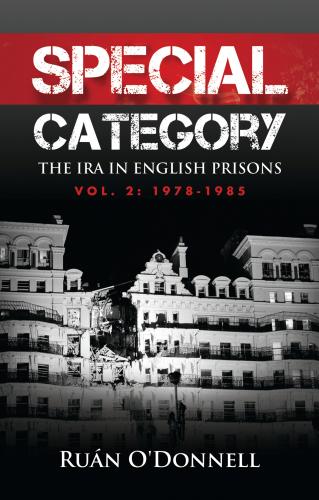165.Billy Armstrong, ‘Fighting all the way’ in AP/RN, 22 February 2001.
166.Brian Keenan, 26 May 2007.
167.‘Wakefield letter’ in IRIS, 24 February 1978. Murray was charged with assaulting two prison officers and in addition to fifty-six days in F Wing lost five months remission of sentence. Ashe received fourteen days in the block after an attack by an English prisoner. Stevie Blake was returned to F Wing from a ‘lie-down’ in Durham before being moved on to Albany. PAC News, June 1978.
168.‘Wakefield letter’ in IRIS, 24 February 1978.
169.Sr. Clarke, ‘Paul Norney’, Clarke Papers (COFLA).
170.‘Wakefield letter’ in IRIS, 24 February 1978.
171.‘Wakefield letter’ in IRIS, 24 February 1978.
172.Republican News, 25 March 1978.
173.Albany PRO to Editor, Republican News, 22 April 1978. They claimed that the Worker’s Party ‘have in fact rejected revolutionary politics and have gone up the blind alley of pragmatism in taking part in elections in both the Six Counties and the Free State. This must ultimately lead to further splits in their movement’. Although both harsh and prophetic, this condemnation was accompanied by an acknowledgement that the Officials contained ‘good individual socialists’, a rare accolade from Provisional prisoners. See Irish Voices, p. 152.
174.Lost Lives, p. 736.
175.Fr. Padraig Fell to Marie Drumm Memorial Committee in Republican News, 20 May 1978. See also Ibid., 10 June 1978. The establishment of the IRSP and INLA in Lucan, County Dublin, on 8 December 1974 ensured that TOM received briefings on their political outlook. INLA Chief of Staff Seamus Costello addressed the TOM convention in the Mansion House, Dublin, on 18 September 1976. See Seamus Costello, 1939–1977, Irish Republican Socialist (Dublin, [1979]), pp. 65–9. For Drumm see Maire Drumm Commemoration Committee, A rebel heart, Maire Bn. Ui Dhroma, pamphlet, October 2001. On 8 August 1980 leading IRSP and INLA member Ronnie Bunting was arrested in Belfast with TOM member Francis Barry. Both were released without charge. Holland and McDonald, INLA, Deadly Divisions (Dublin, 1994) p. 157.
176.See McLaughlin, Inside an English jail, pp. 34–8. Other IRA prisoners moving in and out of Albany in late 1977 and early 1978 included Liam Baker, Paddy Mulryan, Fr. Pat Fell, Pat Christie and Sean Kinsella. Hugh Callaghan of the ‘Birmingham Six’ was also in the prison but did not participate in the IRA protests. Ibid. See also Sr. Clarke, ‘Anthony Cunningham’, Clarke Papers (COFLA).
177.Sr. Clarke, ‘Albany’, Clarke Papers (COFLA).
178.IRIS, 12 January 1979.
179.Report of the work of the Prison Department, 1978, p. 12.
180.McLaughlin, Inside an English jail, pp. 38–9. The Chairman of the Albany Board of Visitors was a retired Royal Navy Admiral whom the IRA believed to be a member of the Conservative ‘Monday Club’. Ibid., p. 39.
181.See HC Deb 21 June 1978 vol 952 cc205–6W.
182.Alastair Logan to Joan Maynard, 5 May 1978, NAE, FCO 87/ 763.
183.Ray McLaughlin to Alastair Logan, 28 April 1978, NAE, FCO 87/ 763.
184.Logan to Maynard, 5 May 1978, NAE, FCO 87/ 763.
185.Lord Harris to Joan Maynard, 11 July 1978, NAE, FCO 87/ 763. The republicans claimed that their visitors were also required to undergo strip-searching and as this was untypical of Category A men such policies constituted ‘discrimination’. [David] Blunt to [Brian] Gange, 10 October 1978, Ibid. Maynard was also in contact with the NIO regarding IRA prisoners in the H-Blocks. See Joan Maynard to Don Concannon, 22 February 1979 in Faul and Murray, H Block, p. 93.
186.PLV Mallet (RID, FCO), ‘Letter from Miss Joan Maynard MP’, Memo, 2 June 1978, NAE, FCO 87/ 763.
187.PAC News, August/ September 1978.
188.Tony Madigan, 7 March 2008.
189.McLaughlin, Inside an English jail, p. 40.
190.McLaughlin, Inside an English jail, pp. 40–41. McLaughlin arrived in Wakefield in May 1978. Irish News, 13 November 1979.
191.AP/RN, 17 October 1985.
192.Sr. Clarke, ‘Albany Notes’, Clarke Papers (COFLA).
193.Tony Madigan, 7 March 2008. Terence MacSwiney, a senior member of the Irish Republican Brotherhood, Irish Republican Army and Sinn Féin, died on hunger strike in Brixton on 25 October 1920 when asserting his status as a political prisoner. He famously declared on taking office as Lord Mayor of Cork: ‘It is not they who can inflict most but they who can suffer most will conquer’. Quoted in Dave Hannigan, Terence MacSwiney, The Hunger Strike that rocked an Empire (Dublin, 2010), p. 11.
194.See Brendan O’Brien, The Long War, The IRA and Sinn Féin, 1985 to today (Dublin, 1993), p. 294.
